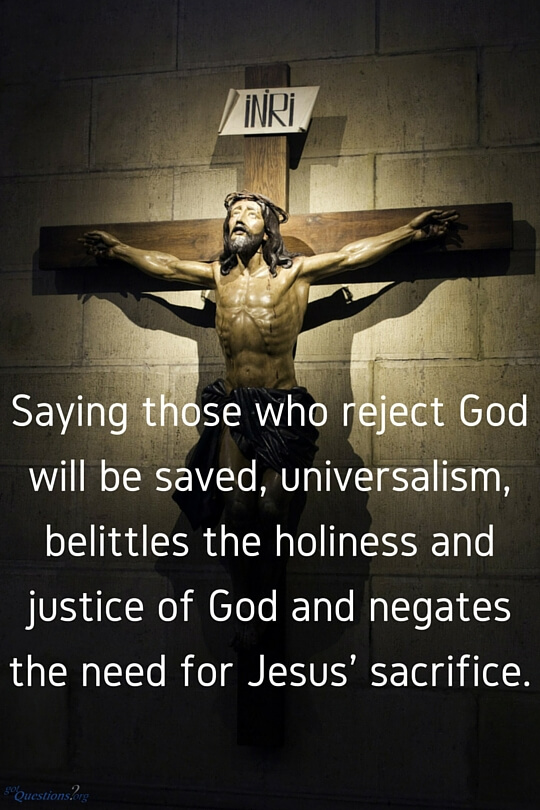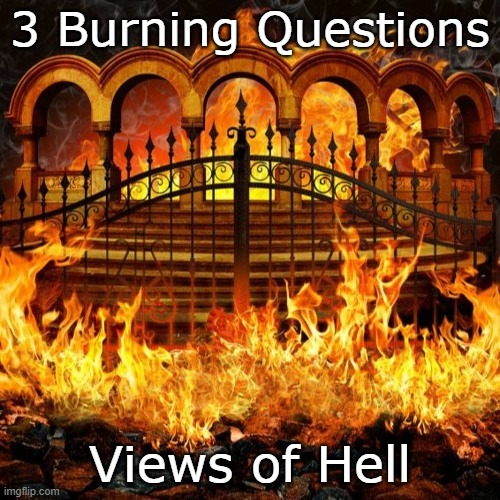3 Burning Questions about the Views of Hell
-After going through the four primary views of hell, there appear to be pros and cons to each particular viewpoint. Though I address some of those burning questions in each individual blog post, I would like to reiterate some of those and expand on others here.
*None of these questions are designed to be accusatory or inflammatory to anyone who holds these beliefs. If anything, they are just the musings of one individual who has a significant number of questions concerning the nature of future punishment and identifying all his thoughts and ideas on paper (you get the point). I am literally thinking aloud while typing these questions and wondering what viewpoint is closest to reality.
- Does eternal conscious torment make God appear as a monster who tortures individuals for eternity for the simple crime of not believing in him?
-This question is at the heart of the perspective of ECT. Many conservative evangelicals presume that “sin must be punished, or God would not be a ‘just’ God.” We have all heard that mantra in one fashion or another. The crux of the argument is that if all are saved (as in universalism), then God would not be deemed “just.” However, torturing individuals for eternity is justice? Again, the standard response is analogous to, “any sin against a holy God, is worthy of eternal punishment.” This question was initially raised in the fourth century by St. Augustine and continues to be raised to day. Augustine was a thinker and asked many, many questions. Just because he asked a particular question does not imply that is precisely what he believed. The church fathers (including Augustine) can be notoriously challenging to interpret.
I do not intend to impose one position on this blog and website over another. On the contrary, I sincerely desire individuals of all thoughts and opinions to feel welcome and discover something that they will learn and grow from on this website. However, the doctrine of ECT is a problematic one for me to personally take seriously because of the extreme and terrorizing punitive nature that indicates non-Christians will be tortured for eternity. Yes, God is just and righteous, but that does not suggest torture is the only method for accomplishing His justice and righteousness. To put it another way, if Mother Theresa stopped believing for some reason towards the end of her life, would perpetual torture be justice for her? And if Hitler somehow converted into a Christian immediately before he died, he would be in Heaven, and that would be justice? This doctrine demands much contemplation and additional resolutions for anyone to be a dogmatic believer in.
- If the Separation View is correct, then what precisely is hell? Does God not seem rather coy with His description of what specifically hell involves?
-Essentially, those who hold to separation consider the language of “fire and flames” to be metaphorical (aka the “metaphorical view”), and as such, hell is a literal place but not a place of torture. But that begs the question, then what precisely is hell? If one were to subtract all the language of fire, and other language that appears to indicate complete destruction and annihilation, what remains? Not much. Then how can one say, “hell is a definite reality,” and also “hell is just separation from God.” Especially considering Gehenna literally means the Hinnom Valley, then how do you have a clear description of hell? In this view, there is virtually nothing to indicate what happens upon death for the non-Christian except a place where there is nothing in Gehenna? I understand that ECT repulses many who hold to separation, but that does not leave much to work with if one were to attempt to comprehend what Scripture declares about hell.
- If Annihilation is correct, does it not make God very close to the God of eternal torment?
In this view, some (though certainly not all) believe there will be some measure of torment for the sinner prior to being annihilated. Would that not imply a relatively callous and vengeful God? Think about the vindictiveness it would take for God (or anyone for that matter) to raise someone already dead, torment them, and then annihilate them. That does not appear to be a God who is concerned that individuals are left to their own chosen fate. Many Christians proclaim that God does not want the sinner to perish. Indeed, Scripture affirms that understanding as well. However, if God wishes all to come to salvation and is heartbroken when people do not accept His gift of grace, He has no other alternative than to raise them, torment them, and then finally annihilate them? Is that the only option? There is plenty of God’s wrath here, but where is the mercy? Only for the Christian and everyone else is damned?
However, others see God as only raising the non-Christian following death, with no torment involved, then annihilating them ala execution-style. My questions above still pertain to this view as well. God is so heartbroken and saddened that He has no other option than to raise the non-Christians who are already dead and execute them? Why not simply leave them dead? Of course, many who hold this position will undoubtedly say that Scripture clearly affirms a bodily resurrection, so what happens to the non-believer?
Similar to eternal torment, the question is naturally raised “would Christians be able to celebrate in Heaven, with God, if their family is burning for eternity in hell?” That is a legitimate question. But it can also pertain to annihilationism. Can you celebrate with God in Heaven if your family is annihilated and you are the only one left? Or how about if your entire family, apart from one child who is annihilated, is in Heaven. Are you ok with that? Could you still look at God and smile, knowing one of your beloved children is destroyed?
- If Universalism is true, then where is God’s justice? Where is His wrath?
-This view is surprisingly challenging to find a “con” about. I am not declaring myself a universalist; however, we ought to also recognize that this view does have a significant appeal to it, whether one believes it or not. One concern, though, is that Scripture repeatedly discusses God’s justice. If all dogs go to Heaven, as the saying goes, then where is His justice that is communicated about often? Does Mother Theresa and Hitler sharing an identical fate seem unfair? Indeed, most universalists imagine there is a “purification” process that one goes through, and it could be considerably lengthier for some than others. However, in my opinion, that position is not clear from Scripture. What even is the definition of God’s justice anyway?
Likewise, where is the “wrath of God” that is also spoken of continuously in Scripture? There does not appear to be much wrath if there is only a purification process after death unless that is a form of torment? Or was the wrath of God only to be poured on Christ when he was being crucified?

-I know some of these questions may be challenging to answer, and some of you may have instantaneous, or standard, responses to some of the objections raised. But I simply ask that perhaps you can think through them and see if those solutions align with what the Bible reveals about God and His character. Perhaps it does, perhaps it does not. Again, these questions are simply intended to generate some deliberation in your own critical thinking skills and are not intended to be insulting to anyone reading them.
If you would like further background information concerning the words translated as hell, check out this website HERE.
Previous blog post on Universalism is found HERE
Next blog post on the History of eternal torment is found HERE


